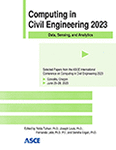Schedule-Driven Analytics of 3D Point Clouds for Automated Construction Progress Monitoring
Publication: Computing in Civil Engineering 2023
ABSTRACT
Timely progress update in the project schedule is essential for managing the critical path and expected project completion date. With the advent of AI-powered construction progress monitoring, inferring up-to-date progress information from visual data (images/videos) has become very much possible. Principally, these methods compare as-built reality models (point clouds) with 4D BIM to estimate element-wise or schedule-activity-wise project progress. Estimated progress is then updated in the project schedules. However, the 4D BIM creation process is time-consuming, and this schedule-linked model often becomes outdated after construction begins. Currently, there is no method to automatically align project schedules and reality models for progress updates without an updated 4D BIM. Therefore, this research proposes an automatic alignment method between project schedules and reality models with or without a 3D BIM. In particular, the reality models are first aligned to the world coordinate system using a 3D BIM or ground control points. Next, two-step point cloud segmentation is employed to detect the progress associated with a specific location, object, and task (L-O-T). Similarly, location, object, and task (L-O-T) information is inferred from each schedule-activity through natural language processing (NLP)-based information extraction. Later L-O-Ts are matched through a distance-based matching technique to link progress information with schedule activities. The method is applied in a precast building construction project, and the preliminary results confirm its applicability for automated progress updates.
Get full access to this article
View all available purchase options and get full access to this chapter.
REFERENCES
Amer, F., and Golparvar-Fard, M. (2019). “Automatic Understanding of Construction Schedules: Part-of-Activity Tagging.” Proceedings of the 2019 European Conference on Computing in Construction, 1, 190–197.
Amer, F., Hockenmaier, J., and Golparvar-Fard, M. (2022). “Learning and critiquing pairwise activity relationships for schedule quality control via deep learning-based natural language processing.” Automation in Construction, Elsevier BV, 134(October 2021), 104036.
Amer, F., Jung, Y., and Golparvar-Fard, M. (2021a). “Transformer machine learning language model for auto-alignment of long-term and short-term plans in construction.” Automation in Construction, Elsevier BV, 132(March), 103929.
Amer, F., Jung, Y., and Golparvar-Fard, M. (2021b). “Transformer machine learning language model for auto-alignment of long-term and short-term plans in construction.” Automation in Construction, Elsevier BV, 132(September), 103929.
Armeni, I., Sax, A., Zamir, A.-R., and Savarese, S. (2017). “Joint 2D-3D-Semantic Data for Indoor Scene Understanding.”.
Devlin, J., Chang, M.-W., Lee, K., and Toutanova, K. (2018). “BERT: Pre-training of Deep Bidirectional Transformers for Language Understanding.”.
Han, K., Degol, J., and Golparvar-Fard, M. (2018). “Geometry- and Appearance-Based Reasoning of Construction Progress Monitoring.” Journal of Construction Engineering and Management, 144(2), 04017110.
Han, K. K., and Golparvar-Fard, M. (2015). “Appearance-based material classification for monitoring of operation-level construction progress using 4D BIM and site photologs.” Automation in Construction, Elsevier B.V., 53, 44–57.
Hong, Y., Xie, H., Agapaki, E., and Brilakis, I. (2023). “Graph-Based Automated Construction Scheduling without the Use of BIM.” Journal of Construction Engineering and Management, 149(2), 1–15.
Maalek, R., Lichti, D. D., and Ruwanpura, J. Y. (2019). “Automatic recognition of common structural elements from point clouds for automated progress monitoring and dimensional quality control in reinforced concrete construction.” Remote Sensing, 11(9).
Pal, A., and Hsieh, S. H. (2021). “Deep-learning-based visual data analytics for smart construction management.” Automation in Construction, Elsevier BV, 131(August), 103892.
Pal, A., Lin, J. J., and Hsieh, S.-H. (2022). “Automated Construction Progress Monitoring of Partially Completed Building Elements Leveraging Geometry Modeling and Appearance Detection with Deep Learning.” Proc. of Construction Research Congress 2022, Arlington, Virginia, USA, 708–717.
Pal, A., Lin, J. J., Hsieh, S.-H., and Golparvar-Fard, M. (2023). Activity percent complete measurement of under-construction building elements through 3D informed semantic segmented orthographic view.
Park, J., and Cho, Y. K. (2022). “Point Cloud Information Modeling: Deep Learning–Based Automated Information Modeling Framework for Point Cloud Data.” Journal of Construction Engineering and Management, 148(2), 1–14.
Pham, V. H., Chen, P. H., Pal, A., Christian, C., and Hsieh, S. H. (2021). “Automatic extraction of daily concrete requirements from 3D BIM and project schedules.” AIP Conference Proceedings, 2428(November).
Ren, R., and Zhang, J. (2021). “An Integrated Framework to Support Construction Monitoring Automation Using Natural Language Processing and Sensing Technologies.” Computing in Civil Engineering 2021 - Selected Papers from the ASCE International Conference on Computing in Civil Engineering 2021, 1101–1109.
Turkan, Y., Bosche, F., Haas, C. T., and Haas, R. (2012). “Automated progress tracking using 4D schedule and 3D sensing technologies.” Automation in Construction, Elsevier, 22, 414–421.
Vu, T., Kim, K., Luu, T. M., Nguyen, X. T., and Yoo, C. D. (2022). “SoftGroup for 3D Instance Segmentation on 3D Point Clouds.”.
Wei, W., Lu, Y., Zhong, T., Li, P., and Liu, B. (2022). “Integrated vision-based automated progress monitoring of indoor construction using mask region-based convolutional neural networks and BIM.” Automation in Construction, Elsevier B.V., 140(1239), 104327.
Zhao, X., Yeoh, K.-W., and Chua, D. K. H. (2019). “Extracting Construction Knowledge from Project Schedules Using Natural Language Processing.” The 10th International Conference on Engineering, Project, and Production Management, 197–211.
Information & Authors
Information
Published In
History
Published online: Jan 25, 2024
ASCE Technical Topics:
- Alignment
- Automation and robotics
- Business management
- Computer networks
- Computing in civil engineering
- Construction engineering
- Construction management
- Construction methods
- Design (by type)
- Engineering fundamentals
- Geometrics
- Highway and road design
- Management methods
- Models (by type)
- Practice and Profession
- Project management
- Scheduling
- Systems engineering
- Three-dimensional models
Authors
Metrics & Citations
Metrics
Citations
Download citation
If you have the appropriate software installed, you can download article citation data to the citation manager of your choice. Simply select your manager software from the list below and click Download.
